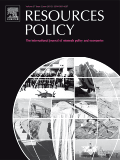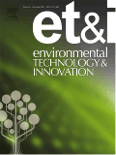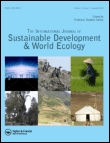
Resources-Basel
Scope & Guideline
Exploring innovative solutions for resource management.
Introduction
Aims and Scopes
- Sustainable Resource Management:
The journal emphasizes sustainable practices in managing both renewable and non-renewable resources, highlighting strategies that balance economic development with environmental conservation. - Environmental Impact Assessments:
Papers frequently explore methodologies for assessing the environmental impacts of various industries, particularly mining and agriculture, promoting awareness and mitigation of negative effects. - Circular Economy Practices:
A core focus is on circular economy models, including waste management solutions and resource recovery, that aim to reduce waste and promote the reuse of materials. - Technological Innovations in Resource Recovery:
The journal showcases advancements in technologies for resource extraction, processing, and recycling, supporting the transition to more sustainable practices. - Community and Policy Engagement:
Research often addresses the role of community involvement and policy frameworks in sustainable resource management, emphasizing the need for stakeholder collaboration.
Trending and Emerging
- Climate Change Mitigation Strategies:
There is a growing emphasis on research that addresses climate change impacts, focusing on adaptive strategies and mitigation efforts across various sectors. - Innovative Waste Management Solutions:
Recent papers highlight innovative approaches to waste management, including recycling technologies and waste-to-energy systems, reflecting the increasing importance of resource recovery. - Biodiversity and Ecosystem Services:
Research exploring the relationship between resource management and biodiversity conservation is gaining traction, emphasizing the importance of ecosystem services in sustainable practices. - Sustainable Agricultural Practices:
An emerging focus on sustainable agriculture, particularly in relation to food security and resource efficiency, is evident in recent studies. - Public Engagement and Education:
There is an increasing trend towards exploring the role of public engagement and educational initiatives in promoting sustainable resource use and management.
Declining or Waning
- Traditional Resource Extraction Methods:
There has been a noticeable decrease in publications focused solely on traditional extraction methods, as the journal shifts towards innovative and sustainable practices. - Non-renewable Resource Exploitation:
Research dedicated to the exploitation of non-renewable resources, such as fossil fuels, has diminished, likely due to increasing global emphasis on sustainability and climate change mitigation. - Single-Disciplinary Approaches:
Papers that approach resource management from a purely disciplinary perspective are less common, as the journal increasingly favors interdisciplinary research that integrates multiple fields.
Similar Journals

Natural Resources Research
Leading the way in environmental research and resource management.Natural Resources Research is a premier academic journal that plays a vital role in advancing the field of environmental science, particularly in the management and sustainable use of natural resources. Published by Springer, the journal boasts an impressive impact factor and is currently ranked in the Q1 quartile for Environmental Science, reflecting its significant contribution to knowledge and research in this domain. With a notable ranking of #21/233 in the general environmental science category and a remarkable 91st percentile, it serves as a reputable platform for researchers, professionals, and students seeking to publish and access high-quality research. The journal's archival span from 1996 to 2024 underscores its longstanding commitment to addressing pressing environmental issues, facilitating robust discussions on natural resource policy, conservation strategies, and innovative technological advancements. While the journal is not open access, it ensures wide dissemination of its content, bolstering the critical dialogue necessary for enhanced understanding and action in the field. Natural Resources Research continues to be an essential resource for those dedicated to sustainability and the responsible stewardship of our planet's resources.

WASTE MANAGEMENT & RESEARCH
Exploring cutting-edge research in environmental engineering.WASTE MANAGEMENT & RESEARCH, published by SAGE PUBLICATIONS LTD, is a premier journal dedicated to advancing the field of waste management and environmental concern. Established in 1983, this esteemed publication spans a comprehensive range of topics within Environmental Engineering, Pollution, and Waste Management and Disposal, with remarkable standings including a Q1 ranking in Environmental Engineering and a Q2 ranking in both Pollution and Waste Management and Disposal as of 2023. With an impressive Scopus ranking, placing it in the top percentiles of its categories, the journal serves as a vital resource for researchers, professionals, and students seeking to explore innovative solutions to waste management challenges. Although not an open access journal, its rigorous peer-review process ensures high-quality and novel research is made available to the academic community. Located in London, UK, WASTE MANAGEMENT & RESEARCH continues to be influential in shaping policies and practices that impact sustainable waste management practices worldwide.

Detritus
Bridging research and practice in environmental science.Detritus, an esteemed open-access journal published by CISA PUBLISHER since 2018, serves as a vital platform for the dissemination of innovative research in the fields of Environmental Chemistry, Environmental Engineering, and Waste Management and Disposal. Based in Padova, Italy, the journal aims to foster scholarly communication and collaboration among researchers, professionals, and students dedicated to advancing our understanding of environmental challenges and solutions. With its open-access model, Detritus ensures that high-quality research is freely available, bridging the information gap within the scientific community. While currently categorized in the Q3 quartile across multiple environmental science disciplines, the journal is poised to further enhance its visibility and impact, contributing significantly to pressing global issues such as waste reduction and sustainable resource management. As the journal continues to evolve, it encourages submissions that advance theory and application in these critical areas.

Resources Policy
Exploring Innovative Pathways in Resource ManagementResources Policy, published by ELSEVIER SCI LTD, is a prestigious journal that has been at the forefront of advancing knowledge in the fields of Economics, Law, and Sociology since its inception in 1974. With an impressive Q1 ranking in multiple disciplines—including Economics and Econometrics, Law, Management, Monitoring, Policy and Law, and Sociology and Political Science—this journal showcases high-impact research and insights that are vital for academics, policymakers, and practitioners alike. With Scopus rankings placing it in the top percentiles of its respective categories, Resources Policy fosters interdisciplinary dialogue, promoting innovative solutions and policies concerning the sustainable management and use of resources. While currently not an open-access publication, the journal ensures that its rich content is accessible to those pursuing rigorous research and professional excellence. As we approach its 50th anniversary in 2024, Resources Policy continues to be an essential platform for critical discussions, evaluation, and advancements in resource management.

NATURAL RESOURCES JOURNAL
Innovating legal frameworks for a sustainable tomorrow.Welcome to the NATURAL RESOURCES JOURNAL, a scholarly publication dedicated to the intersection of law and environmental sciences. Published by the University of New Mexico School of Law, this journal has been a crucial platform since 1977 for scholarly discussions and research that shape our understanding of natural resources management and policy. With an impressive impact factor in the realm of law, ranking in the top 60th percentile, and recognized in the Environmental Science category, it serves as an essential resource for researchers, professionals, and students alike. Although not an open-access journal, it provides in-depth analyses and original research that are pivotal in addressing pressing environmental issues. Our objective is to foster interdisciplinary dialogue and enhance legal frameworks related to natural resource management, ensuring a sustainable future through informed policy-making. Join our community of scholars in exploring the multifaceted challenges and innovations in the field.

Environmental Technology & Innovation
Empowering Researchers to Shape the Future of Our PlanetEnvironmental Technology & Innovation is a leading academic journal published by Elsevier, focusing on groundbreaking research and advancements in the fields of Environmental Science, Plant Science, and Soil Science. Since its inception in 2014, this prestigious journal has established itself in the top Q1 quartiles of its categories, reflecting its commitment to publishing high-quality, impactful research. As evidenced by its impressive Scopus ranks, including a rank of #14/516 for Plant Science and #5/159 for Soil Science, it serves as a vital resource for scholars, researchers, and professionals aiming to advance their understanding and innovation in environmental technologies. Although it operates under a subscription model, the journal provides significant insights and access options, making it an essential addition to any researcher's library. With its emphasis on sustainability and technological advancements, Environmental Technology & Innovation remains at the forefront of addressing global environmental challenges and fostering innovative solutions.

Landscape and Ecological Engineering
Exploring the synergy between nature and design.Landscape and Ecological Engineering, published by SPRINGER JAPAN KK, is a vital journal that serves as a platform for the dissemination of innovative research and methodologies in the fields of landscape ecology and environmental engineering. With an ISSN of 1860-1871 and E-ISSN 1860-188X, this journal showcases articles that address the dynamic interplay between ecological processes and engineering designs in both natural and urban environments. As a significant publication since its inception in 2006, it is recognized in the Q2 quartile for Ecology and Nature and Landscape Conservation, alongside its placement in the Q3 quartile for Management, Monitoring, Policy, and Law, ensuring its relevance across multiple dimensions of environmental studies. The journal's presence in prominent databases, reflected in its Scopus rankings, highlights its commitment to high-quality, impactful research that guides conservation strategies and landscape management practices. Engaging with Landscape and Ecological Engineering provides researchers, professionals, and students with critical insights and developments, promoting sustainable solutions for ecological challenges. This journal is an essential resource for anyone seeking to enhance their understanding of ecological engineering approaches and landscape conservation efforts.

INTERNATIONAL JOURNAL OF SUSTAINABLE DEVELOPMENT AND WORLD ECOLOGY
Elevating research to address pressing environmental challenges.The INTERNATIONAL JOURNAL OF SUSTAINABLE DEVELOPMENT AND WORLD ECOLOGY, published by TAYLOR & FRANCIS INC, stands as a pivotal resource for scholars and practitioners focused on sustainable development and environmental ethics. With an ISSN of 1350-4509 and an E-ISSN of 1745-2627, this journal has made significant strides in the academic landscape since its inception in 1994, aiming to address the complex interrelations between ecological sustainability and development policies on a global scale. Renowned for its rigorous peer-review process, it has achieved a prestigious Q1 classification in both Geography, Planning and Development and Management, Monitoring, Policy and Law, highlighting its influence and relevance among the top tier of scholarly publications. As evidenced by its impressive rankings in Scopus—32nd in Geography and 34th in Environmental Science—this journal plays a critical role in shaping contemporary discourses on sustainable practices. Although it does not currently offer Open Access options, the journal is dedicated to providing a platform for innovative research that not only informs policy-making but also fosters a deeper understanding of global environmental challenges. Whether you are a researcher, policymaker, or student, engaging with the latest findings published in this journal will enhance your insight into sustainable development paradigms.

Environmental Engineering and Management Journal
Empowering scholars to tackle pressing environmental challenges.Welcome to the Environmental Engineering and Management Journal, a pivotal platform for disseminating knowledge and innovative research in the fields of Environmental Engineering, Management, Monitoring, Policy, and Law. Published by GH Asachi Technical University of Iasi in Romania, this journal has been committed to fostering discussions and advancements in environmental solutions since its inception in 1988, with continuous publication from 2002 to 2024. While classified in the Q4 category across various environmental disciplines in 2023, it remains an important resource for scholars and practitioners navigating the complexities of pollution and environmental management. With an ISSN of 1582-9596 and an E-ISSN of 1843-3707, this journal encourages submissions that address pressing ecological challenges and provide actionable insights. Although currently not open access, it seeks to expand its reach and relevance within the global academic community. Join us as we explore critical environmental issues and contribute to sustainable practices worldwide.

Journal of Sustainable Mining
Shaping the future of mining with sustainability at its core.Journal of Sustainable Mining, published by the Glowny Instytut Gornictwa in Poland, is a premier open-access journal dedicated to advancing research in the field of sustainable mining practices. Since its inception in 2013, this journal has been a vital resource for specialists in Environmental Engineering, Geology, and Geotechnical Engineering, with an increasing focus on sustainability within these disciplines. With its current rankings placing it in the Q3 category across multiple related fields, the journal aims to foster innovation by disseminating high-quality, peer-reviewed research essential for the development of environmentally friendly mining solutions. Notably, it is indexed in Scopus, catering to a global audience of researchers, professionals, and students interested in sustainable practices that minimize environmental impact. As it continues to converge until 2024, the Journal of Sustainable Mining plays an integral role in shaping the discourse around responsible resource extraction, making it a must-read for anyone invested in the future of mining and environmental stewardship.